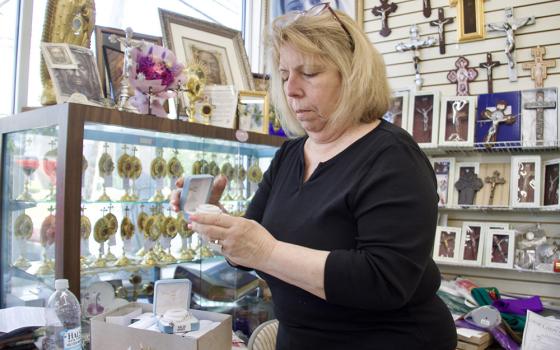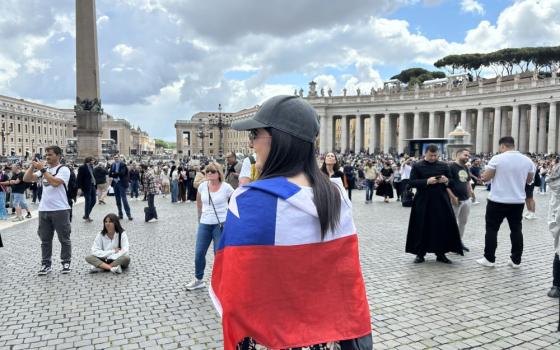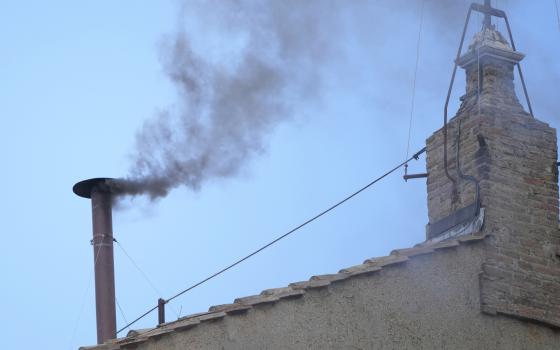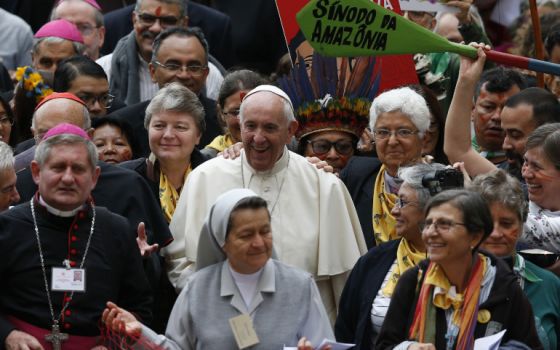
Cardinal Víctor Manuel Fernández, former prefect of the Dicastery for the Doctrine of the Faith, celebrates Mass on the sixth day of the "novendiali," nine days of mourning for Pope Francis, at the Altar of the Confession in St. Peter's Basilica at the Vatican May 1, 2025. (CNS/Lola Gomez)
This week, the cardinals are discussing a variety of issues, from Vatican finances to synodality. The conclave is, as expected, a referendum on Pope Francis' reform efforts.
But the cardinals will elect a person next week, not a platform. So, while they are discussing issues facing the church and the world, they are also assessing each other's personalities and character.
That assessment will dovetail with the dynamics of the voting. A front-runner like Cardinal Pietro Parolin may be faulted for his lack of charisma. To those who want a course correction from Francis, someone who will not take risks, Parolin's managerial temperament might be appealing. Someone who emerges as an alternative to Parolin, such as Cardinal Robert Prevost, head of the Dicastery for Bishops, shares Parolin's low-key temperament but is more obviously supportive of continuing Francis' reforms. The choice there is about policy, not personality.
Will the cardinals instead want someone with more charisma?
Advertisement
If a conclave appears deadlocked, with none of the front-runners apparently able to secure the necessary votes, the cardinals may choose to take a chance on someone less well-known, or even someone younger. In the October 1978 conclave, when it became apparent that Cardinal Giovanni Benelli of Florence would never secure the two-thirds plus one vote needed for election, the cardinals expanded their search and the Polish Cardinal Karol Wojtyla's star rose until he was elected on the third day of the conclave.
As I noted previously, if the conclave goes to a third day, all bets are off. Then, a younger candidate or less well-known candidate might emerge. The cardinals do not want another 27-year long pontificate like that of John Paul II, but if the older front-runners stumble, the search will widen. A younger or less well-known candidate would only become a contender if he delivers a compelling intervention during the general congregations.
Two names that pop up among the list of outsiders getting some attention are Cardinals Pierbattista Pizzaballa, Patriarch of Jerusalem for the Latins, and Cardinal Pablo "Ambo" David of the Philippines. Pizzaballa is only 60-years-old, which is considered young for a cardinal and David was only created a cardinal last December, so he is not well-known. Still, if they make a good impression and no other candidate seems compelling, one of these two men could become contenders.
Pizzaballa is also a Franciscan. Cardinals who come from religious orders "land well" one cardinal told me. They have a sense of ecclesial mission that is internalized as part of their formation in their religious order. In the consistory last December, half of the new cardinals belonged to a religious order. Cardinal Leonardo Steiner, of Manaus, Brazil, is also a Franciscan, and his name is on some shortlists of papabile. Prevost is an Augustinian. Newark, New Jersey, Cardinal Joseph Tobin is a Redemptorist. Cardinal Cristóbal López Romero, archbishop of Rabat, Morocco, another cardinal whose name comes up with some frequency, is a Salesian.
Not only does a cardinal who belongs to a religious order land well, they are likely to be known to other cardinals who belong to the same order. There are eight Franciscan cardinals among the electors and five Salesians. They will be known to one another and they hail from different continents. It is a network that could become useful when other cardinals want to know about someone whose vote count is rising.

Cardinal Pietro Parolin, Vatican secretary of state under Pope Francis, processes into Mass on the fifth day of the "novendiali," nine days of mourning for the late pope, in St. Peter’s Basilica at the Vatican April 30, 2025. (CNS/Lola Gomez)
Sometimes, when there is a deadlock, the cardinals do not search for someone new and exciting but for someone who is secure and stable, or at least someone they can live with. This choice is especially appealing to cardinal electors who are more transactional and have a specific bit of business for the new pope. For example, if a cardinal is approaching 75 years, the mandatory retirement age, or even a little past it, their principal concern may be to secure a successor they want. Other cardinals might have one issue that is nonnegotiable and, if reassured on that point, will vote for a compromise candidate who is seen as competent if not charismatic.
No matter who emerges, one question will hang over any candidate who begins to move up in the voting: How did he handle clergy sex abuse? It is difficult to imagine anything worse for the papacy than to elect a man who, in short order, is found to have covered up abuse or, still worse, who might be accused of abuse himself. I suspect the cardinals will want some reassurance on that score.
Questions about personality come with a huge asterisk. Being elected pope is an awesome responsibility, but enjoying the confidence of two-thirds plus one of the cardinals surely provides more than a little self-confidence to the person selected. It is difficult to find a photo of Cardinal Jorge Bergoglio smiling when he was in Argentina. His election as pope transformed him. The cardinals who elected Pope John XXIII in 1958 thought they were getting an old man who would not shake things up. Instead, he convened the Second Vatican Council.
All of us would love to be a fly in the synod hall where the general congregations are taking place. The briefings from the Holy See press office focus on the issues being discussed. But the cardinals are examining each other's character, not just where they stand on a given issue. Arguably, those judgments may be more important than any particular issue.







